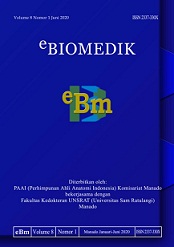Pola bakteri aerob yang berpotensi menyebabkan infeksi nosokomial di ruangan Instalasi Rawat Darurat Obstetri dan Ginekologi (IRDO) RSUP Prof. Dr. R. D. Kandou Manado
Abstract
Abstract: Nosocomial infection or Health-care Associated Infection (HAIs) according to the WHO in 2011 are infection to patient acquired during a hospital, after ≥48 hours and ≤30 days after out of the hospital. Factor of infection can be differentiated between patients, nurses, doctors, hospital employed, hospital environment and patient visitor or family. The purpose to know the pattern of aerobic bacteria that could potentially to involve nosocomial infection in the Emergency room of Obstetric and Gynecology (IRDO) Prof. Dr. R. D. Kandou Manado. Type a descriptive observational research with cross sectional study approach. The sampling on the walls, floors, medical equipment, room furniture and the air in the IRDO Prof. Dr. R. D. Kandou Hospital Manado. The results of the 27 samples found bacteria Bacillus sp.(46,55%), Staphylococcus sp. (18,97%), Streptococcus sp. (10,34%), Klebsiella pneumoniae (8,62%), Enterobacter aerogenes, Serratia liquefaciens, Enterobacter cloacea, proteus sp. (3,45%), Neisseria sp. (1,72%).Conclusion: The most aerobic bacteria in the Emergency room of Obstetric and Gynecology (IRDO) Prof. Dr. R. D. Kandou Manado is Bacillus sp.(46,55%).
Keywords: Emergency Obstetric and Gynecology, nosocomial infection, aerobic bacteria.
Abstrak: Instalasi Rawat Darurat Obstetri dan Ginekologi (IRDO) adalah suatu instalasi penanggulangan awal penderita rawat darurat untuk mencegah kematian, dalam menangani kesehatan reproduksi wanita saat tidak hamil ataupun pada saat hamil, persalinan, dan nifas. Infeksi nosokomial atau Health-care Associated Infection (HAIs) menurut WHO 2011 merupakan infeksi yang didapat pasien selama di rumah sakit, setelah ≥ 48 jam dan ≤ 30 hari setelah keluar dari rumah sakit. Faktor terjadinya infeksi bisa dibebakan antar pasien, perawat, dokter, karyawan rumah sakit, lingkungan rumah sakit, dan pengunjung atau keluarga pasien. Tujuan untuk mengetahui pola bakteri aerob yang berpotensi menyebabkan infeksi nosokomial pada ruangan Instalasi Rawat Darurat Obstetri dan Ginekologi (IRDO) RSUP Prof. Dr. R. D. Kandou Manado. Jenis penelitian deskriptif observational dengan pendekatan studi cross sectional. Pengambilan sampel pada dinding, lantai, peralatan medis, perabotan ruangan, udara di ruangan Instalasi Rawat Darurat Obstetri dan Ginekologi (IRDO) RSUP Prof. Dr. R. D. Kandou Manado. Hasil penelitian dari 27 sampel ditemukan bakteri Bacillus sp.(46,55%), Staphylococcus sp. (18,97%), Streptococcus sp. (10,34%), Klebsiella pneumoniae (8,62%), Enterobacter aerogenes, Serratia liquefaciens, Enterobacter cloacea, proteus sp. (3,45%), Neisseria sp. (1,72%). Simpulan: Bakteri aerob di ruangan Instalasi Rawat Darurat Obstetri dan Ginekologi (IRDO) RSUP Prof. Dr. R. D. Kandou Manado yang terbanyak ialah Bacillus sp.(46,55%).
Kata kunci: Instalasi Rawat Darurat Obstetri dan Ginekologi (IRDO), Infeksi nosokomial, bakteri aerob
Full Text:
PDFDOI: https://doi.org/10.35790/ebm.v4i2.14643
Refbacks
- There are currently no refbacks.





